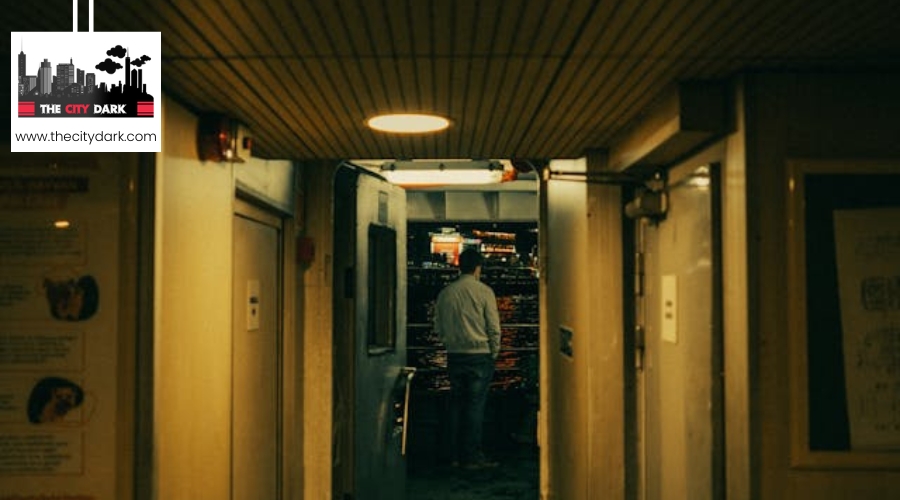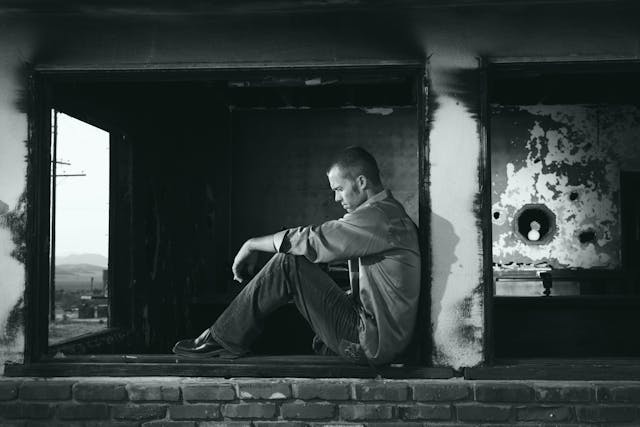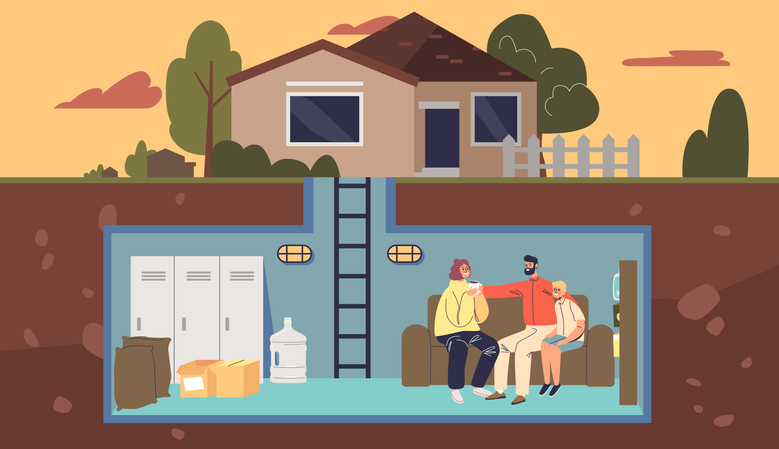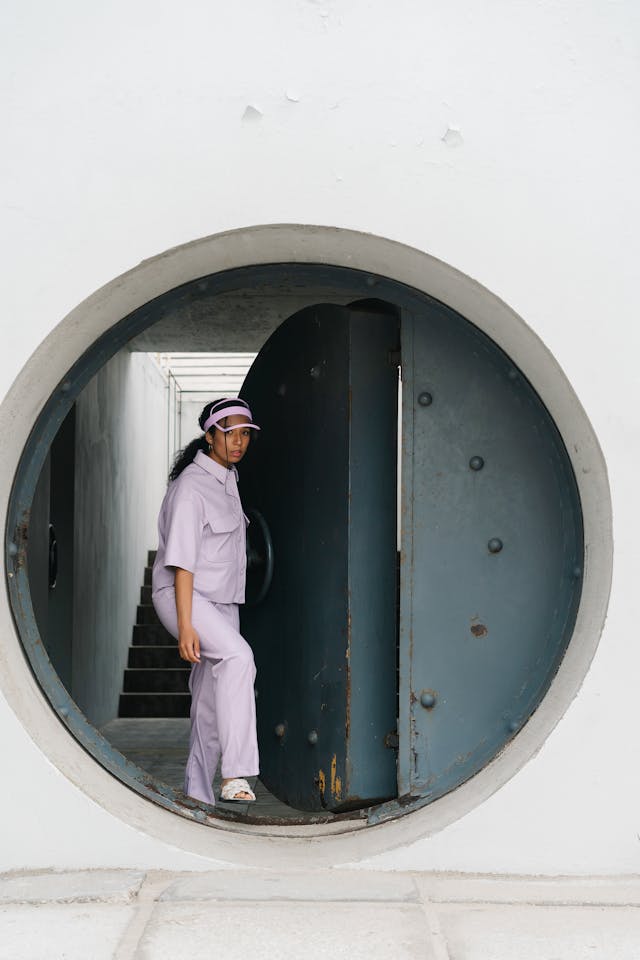In an era where digital connectivity should, in theory, make you feel less isolated, the reality of living in a bunker for extended periods throws you back into a quasi-medieval state of seclusion. You’ll find that the psychological toll isn’t just a matter of battling boredom or finding creative ways to pass time. Instead, the crux of the challenge lies in dealing with the profound feelings of isolation, heightened stress, and the looming shadow of anxiety that can significantly impact your mental health.
The lack of sunlight, the monotony of the confined space, and the absence of face-to-face social interactions weave together a complex tapestry of psychological effects. As you navigate through this unique form of existence, you’re left to wonder: how does this prolonged seclusion shape your psyche, and what mechanisms can you employ to safeguard your mental well-being?
The answers, rooted in both personal resilience and community support, offer a compelling insight into the human capacity to adapt and overcome.
Key Takeaways
- Sunlight deficiency and lack of natural light in a bunker can have significant negative effects on mood, cognitive function, and overall mental health.
- The spatial constraints and lack of privacy in a bunker can lead to increased stress levels, feelings of claustrophobia, and difficulties in concentration.
- Social isolation in a bunker can severely impact mental health, leading to loneliness, depression, anxiety, and a loss of essential social skills.
- However, extended bunker habitation can also lead to strengthened family bonds, fostering a deeper connection and enhancing psychological well-being.
The Sunlight Deficiency Effect
Living in a bunker for an extended period can lead to a sunlight deficiency effect, significantly impacting your mood and cognitive function due to the lack of natural light exposure. This absence not only messes with your mental health but also leads to vitamin D deficiency, closely linked to feelings of depression and fatigue. You might find yourself battling Seasonal Affective Disorder (SAD), marked by a deep sense of lethargy, sadness, and irritability that seems to cling no matter what you do.
The absence of sunlight disrupts your body’s internal clock, throwing off your sleep patterns and fueling anxiety and stress. These psychological effects aren’t just fleeting feelings; they’re markers of how integral natural light is to your well-being.
In a bunker, devoid of public spaces and the ebb and flow of day and night, addressing this deficiency becomes crucial. It’s not just about finding artificial sources of light but understanding the profound impact the lack of natural light has on you. Remember, safeguarding your mental health isn’t just about managing stress; it’s about replicating the conditions that keep your mind and body in harmony, even when the outside world is far from reach.
Spatial Constraints Stress
When you’re cooped up in a bunker, the tight quarters can quickly lead to feelings of irritability, frustration, and a sense of being trapped, known as spatial constraints stress. This type of stress is a direct result of the limited time you can spend away from the confined space and the minimal available space you have to move and live in. The psychological distress manifests in various ways, significantly impacting your mental well-being.
- Limited physical space can trigger feelings of helplessness, potentially leading to aggression, depression, and even acute stress disorder.
- The lack of privacy and personal space intensifies stress and anxiety levels, making it harder for individuals to find moments of tranquility or personal reflection.
- Confinement effects include decreased efficiency and difficulties in concentration, complicating daily tasks and interactions within the bunker.
Special groups such as children, pregnant women, and the ill may experience these psychological challenges more acutely, exacerbating their existing conditions. The compact living conditions of bunker habitation demand a robust coping strategy to mitigate the adverse effects of spatial constraints stress.
Social Isolation Consequences
You’ll find that extended stays in a bunker can severely impact your mental health, leading to a decline due to lack of interaction and support. Interestingly, this situation can also strengthen bonds within your family, as you’re all you have in such confined spaces. However, you might lose essential social skills, making reintegration into society challenging once you emerge.
Mental Health Decline
Extended bunker habitation can significantly impact your mental health, leading to stress, anxiety, and a sense of isolation. The psychological impact of such confinement can lead to a mental health decline, manifesting in several negative psychological outcomes.
Here’s a quick look at what you might encounter:
- High levels of stress and anxiety due to lack of social interaction and support systems.
- Feelings of frustration and helplessness, which can evolve into more serious conditions like depression and aggression.
- The potential for a traumatic experience, especially for vulnerable groups such as children, pregnant women, and the ill, leading to long-term psychological trauma.
It’s crucial for leaders to consider the long-term negative psychological effects of bunker living and prioritize the well-being of those confined.
Strengthened Family Bonds
While the mental health decline is a significant concern in extended bunker habitation, it’s also worth noting that this situation can lead to strengthened family bonds, offering a unique form of emotional support and unity.
When you’re confined with your loved ones, facing social isolation together, you rely on each other more than ever. This reliance fosters a deeper connection, enhancing your psychological wellbeing.
Collaborating on daily tasks due to limited space and resources strengthens these bonds further, creating a shared sense of purpose. Overcoming such challenges together not only boosts your mental and physical health but also builds resilience within the family unit.
You’ll find that this experience leads to a greater appreciation for one another, developing a stronger, more understanding relationship that lasts well beyond the bunker’s walls.
Loss of Social Skills
Prolonged isolation in a bunker can significantly erode your social skills, leading to challenges in communication and understanding others. The psychological trauma of extended bunker habitation strips away the nuances of social interactions, leaving you feeling out of place once you re-enter society.
This loss of social skills manifests in several ways:
- A reduced ability to empathize and understand social cues, making it harder to connect with others.
- A diminished capacity to resolve conflicts and adapt to new social situations, leading to potential misunderstandings.
- Decreased social support networks and a weakened sense of belonging, intensifying feelings of loneliness and isolation.
Extended bunker habitation doesn’t just isolate you physically; it profoundly impacts your ability to interact and bond with others, reshaping your social landscape.
Coping Mechanisms Explored
In exploring how individuals cope with extended bunker habitation, it’s crucial to understand the psychological journey from initial guilt to long-term adaptation through various support systems and activities.
The coping mechanisms explored highlight the transition from self-accusation to finding solace in the company of family, friends, and even work. Initially, you might grapple with personal guilt, questioning your decisions and actions. This phase is tough, but it’s a stepping stone towards healing.
As you move to the mid-term recovery phase, opening up and communicating with others becomes your lifeline. Discussing your fears and hopes helps mitigate the psychological impact, making the burden of bunker living somewhat lighter. This is when the importance of a support network really shines through.
In the long-term recovery phase, the influences of family, neighbors, and colleagues play a pivotal role. You’ll find that environmental changes, engaging in work, practicing religion, indulging in hobbies, and reflecting on past adversities act as protective factors, cushioning the health effects of extended bunker habitation.
Each story of survival and adaptation is unique, thanks to a sampling strategy that captures a wide range of coping experiences across different ages, occupations, and levels of exposure.
Emergence of Psychological Disorders
Extended bunker habitation often triggers a range of psychological disorders, including irritability, depression, and personality changes. You’re not alone if you’ve felt these shifts. A qualitative study focusing on individuals who’ve spent extended periods in bunkers has illuminated the harsh reality of the psychological toll taken. The emergence of psychological disorders isn’t just a possibility; it’s a prevalent outcome for many facing the unique stresses of underground living.
Key points from the study include:
- The development of posttraumatic stress disorder (PTSD) in individuals exposed to prolonged confinement, highlighting the severe impact of isolation.
- A significant increase in reported cases of depression, underlining the emotional and mental strain experienced.
- Noticeable changes in personality, often marked by heightened irritability and a decreased ability to cope with stress.
These findings underscore the critical need for mental health support for those living in such extreme conditions. The psychological problems stemming from extended bunker habitation aren’t just temporary; they can have long-lasting effects on one’s mental well-being. Understanding the risks and preparing to address them is crucial for anyone facing the prospect of prolonged underground living.
The Role of Routine
While facing the daunting psychological challenges of bunker habitation, establishing a daily routine can be your lifeline to mental stability and well-being. In the confined and uncertain environment of an underground bunker, routine provides structure and predictability. Engaging in daily routines fosters a sense of normalcy and stability, acting as a crucial counterbalance to the isolation and unpredictability that can exacerbate psychological distress.
Routine activities serve as a distraction, helping you maintain a sense of purpose and control. This sense of control is vital in mitigating feelings of helplessness and isolation, common psychological negative effects of extended bunker habitation. Moreover, adhering to a routine contributes significantly to maintaining your mental health. It’s a proactive step in preventing the onset of psychological distress that can arise from prolonged periods in such an environment.
In essence, the role of routine in bunker habitation can’t be overstated. It’s not just about passing the time; it’s about preserving your mental well-being, creating stability in an unstable situation, and providing a framework that helps mitigate the psychological negative effects of extended underground living.
Resilience and Mental Health
Facing the psychological challenges of bunker habitation head-on, building resilience is your key to maintaining mental health. A recent study revealed the adverse effects prolonged isolation can have, but it also highlighted how certain strategies can mitigate these impacts. Participants described their journey through extended bunker habitation, underscoring that resilience isn’t just about enduring but thriving under difficult circumstances.
To paint a clearer picture:
- Maintaining a Positive Support System: Whether through digital communication or within your bunker community, staying connected with others plays a critical role.
- Practicing Stress-Reducing Techniques: Meditation, deep breathing, and yoga aren’t just trendy; they’re tools that can help you navigate the stormy waters of isolation with a calmer mind.
- Regular Physical Activity: Even in confined spaces, finding ways to move helps release endorphins, boosting your mood and keeping the adverse effects of cabin fever at bay.
Navigating Emotional Turbulence
Building on the foundation of resilience and mental health, let’s explore how you can effectively navigate the emotional turbulence that comes with prolonged bunker habitation. The psychological impact of such an environment often manifests as a complex mix of emotions, challenging your mental well-being. Recognizing and acknowledging your feelings without casting judgment is your first step toward managing this turbulence.
It’s crucial to allow yourself the space to feel and process your emotions, understanding that it’s a normal response to an abnormal situation.
To mitigate the symptoms among those living in extended bunker habitation, practicing self-care and stress management techniques becomes indispensable. Incorporating deep breathing, meditation, and physical exercise into your routine can significantly regulate your emotional state. Moreover, seeking social support and connection with others plays a vital role in alleviating the feelings of isolation and confinement synonymous with bunker life.
Engaging in activities that provide you with a sense of control and purpose can help reduce feelings of frustration and helplessness. And, if you find yourself grappling with prolonged psychological distress or trauma, consider seeking professional mental health support.
Navigating emotional turbulence is a journey of self-care, resilience, and seeking help when needed.
Long-Term Adaptation Strategies
As you adapt to life in a bunker, building mental resilience is crucial. You’ll find that fostering social interactions and establishing routines offer a foundation for stability and well-being. These strategies not only combat the challenges of confinement but also pave the way for a healthier psychological state.
Mental Resilience Building
Fostering social support networks within your bunker community can significantly boost mental resilience and lessen feelings of isolation during extended stays. Understanding the psychological impact of extended bunker habitation is crucial for your well-being.
To combat these challenges, consider implementing the following long-term adaptation strategies:
- Establish a daily routine to create a sense of normalcy and control.
- Promote regular physical activity to mitigate the effects of prolonged confinement on mental health.
- Encourage open communication for expressing emotions and addressing psychological stress effectively.
These strategies are pivotal in building mental resilience and ensuring the public health of everyone enduring extended bunker habitation.
Social Interaction Dynamics
Understanding how to maintain healthy social interactions is crucial when adapting to long-term bunker habitation. The number of people you’re confined with can significantly influence social interaction dynamics, shaping the psychological impact of your experience.
Implementing strategies like scheduled group activities and communal meals helps preserve mental well-being amid extended bunker habitation. It’s also essential to develop collaborative decision-making and conflict resolution mechanisms to manage stress effectively and maintain positive dynamics.
Establishing structured communication channels, conflict mediation processes, and cultivating a strong sense of community within the bunker are vital long-term adaptation strategies. These efforts not only mitigate the psychological impact but also bolster emotional resilience and mutual aid, ensuring a supportive social network thrives even in such confined conditions.
Routine Establishment Benefits
Regularly establishing a daily routine can significantly improve your sense of structure and normalcy during extended bunker habitation. Interviews were conducted, revealing the need to understand the profound psychological benefits that routine establishment brings.
Here’s how you can leverage these benefits:
- Engaging in regular physical activity and exercise mitigates the psychological impact of confinement.
- Allocating time for leisure activities and entertainment maintains mental well-being.
- Implementing clear communication and conflict resolution strategies promotes a sense of community.
These strategies not only help you adapt to the bunker environment but also ensure that the psychological toll is minimized.
Conclusion
Living in a bunker for a long time can really take a toll on your mental health. You’re likely to feel stressed and isolated, missing the sun and feeling cramped. Finding ways to cope, like sticking to routines, can help. It’s crucial to watch out for signs of deeper psychological issues, though. As you emerge, adapting back to normality won’t be easy, but resilience and the right strategies can guide you through the emotional storm and help you adjust in the long run.






